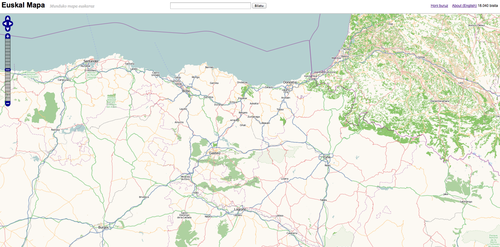Today we chat with longtime OSM contributor Gari Araolaza about the state of OpenStreetMap in the Basque region.

1. Who are you and what do you do? What got you into OpenStreetMap?
My name is Gari Araolaza, I am one of the founders of CodeSyntax, which is a Basque company created in 2000 with the goal of developing multilingual content services and applications for Internet. If you want a simpler explanation, I tell my mum that I develop multilingual websites (which she doesn’t understand anyway). Currently our main activity is the development of all kinds of applications for Internet, operating in many languages. This is where we are good at.
Back in 2005, CodeSyntax launched one of the first GoogleMaps mashups: Tagzania, so we were somehow interested on maps ;-) . As any curious child, I have always been interested on maps and encyclopedias and in 2005, a met a guy that told me about OpenStreetMap. I found it to be a great idea, so I registered and started editing immediately.
Previously, I had participated in collaborative global projects like the Open Directory Project and had made some attempts to work on Wikipedia, but I found writing articles was more difficult than drawing roads or set street names, so I very quickly became an OpenStreetMap junkie.
I was also excited by the possibility of a global geographic database that would be filtered and displayed in many different ways depending on the interests of each user be thematic interest, regional languages, may be because of my multi-language background.
2. What would you say is the current state of OSM and the OSM community in Basque?
I think that many of us are in the typical relax phase like “hey, it seems that the main things are done, so let’s rest for a while”, so I don’t feel much OSM community movement around. However, simply visiting any OSM active area in the world is enough to discover that there is much that you we can still work on our streets. I feel that we have this “most work is done” illusion.
3. What are the unique challenges and pleasures of OpenStreetMap in Basque? What should the rest of the world be aware of?
The territory of our language, Basque (or Euskera, as we call it), is an area of 20,000 km2 on both sides of the France-Spain border, so the need for place names in more than one language has emerged naturally from the first day in OSM. But it’s not only local names, as we have names for the most relevant points of world geography, so it is very important for us to have such a powerful tool to be able to write and read names as Frantzia (France), Herbehereak (Nederlands) or Lurmutur hiria (Cape Town) for example. A few years ago, we created some tiles from OSM filtering place names in basque and published them in http://euskalmapa.com.
Additionally, we believe that it is very important for a a minority language as ours to see that the default map view of the Basque Country is displayed in the local language so that there is an international understanding to a reality that exists and we surface our head on the ocean of the big languages.
4. What could the global OSM community do to better overall support OSM in the Basque Country?
I think that just being sensitive to the minority languages would already help We tend to think of Europe as a continent of 50 countries, but in reality we are talking about a diversity of more than 125 languages, only in Europe. This often leads to leads to difficult issues (technical glitches, official practices, accuracy, practical usability for all users, respect for diversity… ) but I think it’s worth addressing them to give both a global and a local solution to the problem of geographic information.
5. OSM recently celebrated its 10th birthday, where do you think the project will be in 10 years time, both globally and in your region specifically?
I guess the commercial use of OSM and will be fully established and there will be many businesses interested in controlling the project. This big interest could be a double-edged sword, but I am sure that the OpenStreetMap Foundation will know how to manage.
Specially in the Basque Country OSM will be established as the main source of geographic information. By that time, I wish we had a better integration between OSM and the big geographic data managers around: our various governments and public bodies.
Many thanks Gari, to you and all the Basque mappers. The next time I am sipping a patxaran I will toast your efforts! As someone who is multilingual myself and raising my children multingually it is great to see OSM as a tool to help promote and encourage language diversity.
Eskerrik asko,
You can see all the Open Geo interviews here. If you are or know of someone we should interview, please get in touch, we’re always looking to promote people doing interesting things with open geo data.